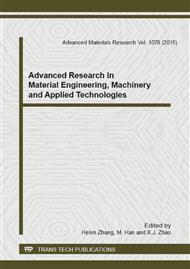p.12
p.20
p.25
p.31
p.36
p.40
p.45
p.49
p.53
Study on the Hydrolysis of PET Catalyzed by Carbonates under Microwave Irradiation
Abstract:
A study for optimizing the experimental conditions for the hydrolysis of polyethylene terephthalate (PET) catalyzed by carbonates was performed. The main influence factors of PET microwave hydrolytic reaction, such as the reaction temperature, time and catalyst dosage, were confirmed and these effects on the catalysis of PET microwave hydrolysis were studied in detail. The results showed that the sequence of influence factors was reaction temperature>reaction time> catalyst dosage. The optimal experimental conditions under the catalyst of basic zinc carbonate were that the catalyst dosage, 0.75%; the reaction time, 210 min; the reaction temperature, 200°C.
Info:
Periodical:
Pages:
36-39
DOI:
Citation:
Online since:
December 2014
Authors:
Keywords:
Price:
Сopyright:
© 2015 Trans Tech Publications Ltd. All Rights Reserved
Share:
Citation:


